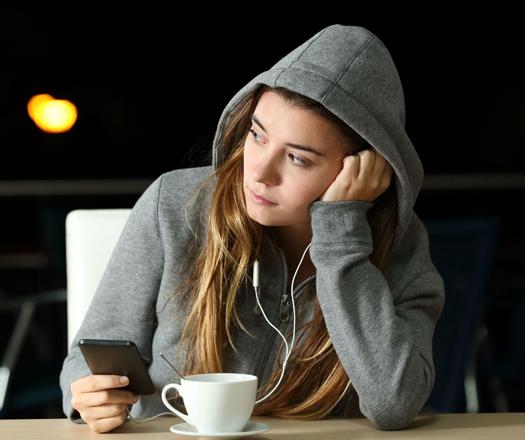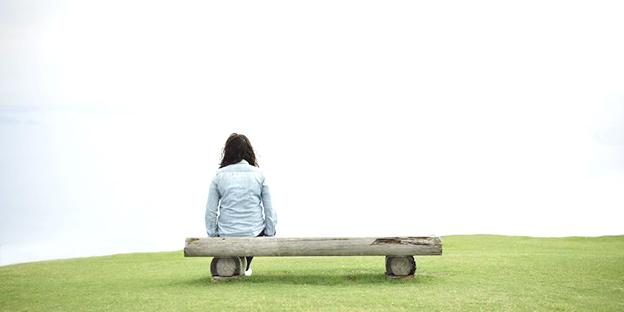You are here
Nearly two-thirds of American adults report feeling lonely
By The Columbus Dispatch, Ohio (TNS) - Jan 28,2020 - Last updated at Jan 28,2020

AFP photo by Antonio Guillem
Americans are feeling increasingly isolated, and healthcare officials are warning that can lead to an increased risk of death.
“We see higher rates of mortality among those who are socially isolated,” said Emily Allen, AARP’s senior vice president of programmes.
Three in five, or 61 per cent, of adult US workers reported being lonely, up more than five-fold from 2018, according to Cigna’s recently released 2020 Loneliness Index.
The health insurer found the spike in loneliness in surveying more than 10,000 adult workers in July and August of 2019.
Work conditions play a big role, according to the annual survey.
“The trends shaping how we work — increasing use of technology, more telecommuting and the always-on work culture — are leaving Americans more stressed, less rested, spending more time on social media and less time with friends and family,” David Cordani, Cigna’s president and CEO, said in a statement.
Experts say the trend is disturbing because loneliness and social isolation have been estimated to shorten a person’s life by 15 years, equivalent in impact to being obese or smoking 15 cigarettes per day.
People who are socially isolated also have a 29 per cent increased risk of mortality, according to a 2018 study by Brigham Young University researchers.
The increase in people feeling isolated comes amid a rising mental-health crisis in America, which is leading to burnout in the workplace, said Sara Konrath, an associate professor of philanthropic studies at Indiana University-Purdue University Indianapolis.
“People are pushing themselves so hard when it comes to work-related topics… and what this does is push away our time for relaxing,” Konrath said. “Not just [watching] Netflix but hanging out with people. … This is stuff we know from research that is really good for our bodies.”
People often use social isolation and loneliness interchangeably, but they differ, experts say.
Social isolation is the objective physical separation from other people (living alone), while loneliness is the subjective distressed feeling of being alone or separated, according to the National Institute on Aging.
“You could be in a room of 100 people and still feel very lonely,” AARP’s Allen explained.
Social isolation can lead to a slew of health problems, including high blood pressure, heart disease, obesity, a weakened immune system and even death.
It has also been linked to anxiety, depression, substance abuse and suicidal thoughts, said Marilyn Sampilo, a licensed psychologist at the Centre for Behavioural Health at the Cleveland Clinic.
While living alone does not inevitably lead to social isolation, it can be a contributing factor, Konrath said. The number of people living alone in the US jumped from 13 per cent in 1950 to 28 per cent in 2019, she said.
“It just makes you want to get a roommate,” Konrath said.
Social media can have an impact on loneliness and social isolation.
Smartphones and social media can help people feel connected, Konrath said.
Yet, “It’s not as satisfying just to connect for a minute online compared to healthy, positive, face-to-face interactions,” she said.
Negative experiences on social media are linked to more feelings of social isolation, according to a new study by the University of Pittsburgh Centre for Research on Media Technology and Health.
The study found that for every 10 per cent increase in negative interactions on social media, study participants were 13 per cent more likely to feel lonely.
And social isolation affects people of all ages.
For youths, social isolation can lead to behavioural problems and poor social skills, Sampilo said. And missing lots of school can lead to social isolation.
Adults who are going through a transitional period — such as moving to a new city, starting a new job or graduating college — are more likely to experience social isolation, she said.
Dalton Reyburn, 23, of Olde Towne East, is familiar with social isolation.
He works from home most days for Keno Kozie Associates, a Chicago-based Internet technology company that offers support to legal firms across the country.
He rarely goes into his Arena District office and barely sees his coworkers.
“There is a bit of a missing-out feeling; it comes and goes,” he said.
Reyburn said most of his coworkers are also older than him, and they don’t have a lot in common.
“Coworkers are generally the most effective way to make friends and have people to hang out with outside of work, so losing that as that avenue of making friends is a little difficult,” he said.
Older adults are at particular risk of social isolation and retirement can be a contributing factor. AARP estimates 17 per cent of older Americans experience some level of isolation, Allen said.
Meals on Wheels can help seniors feel more connect.
Robin Lowry, 57, of Hilliard, has been delivering food to people in the area as a Meals on Wheels volunteer for the past 15 years.
“You feel bad for the people,” Lowry said. “You know you might be the only person they might talk to.”
By Megan Henry
Related Articles
Volunteering at least two hours a week may go a long way towards helping to ease feelings of loneliness and social isolation, a study of rec
PARIS — Feeling lonely contributes less to the risk of cardiovascular disease than recent research suggests, scientists said on Tuesday, but
Adults who spend just 20 minutes a day using a smartphone mindfulness training app may feel less lonely and have more social interactions th



















